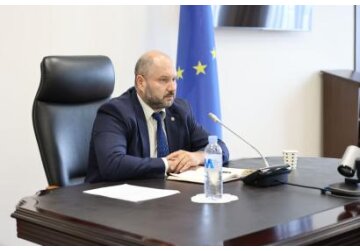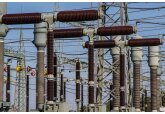
The share of electricity purchases from Moldavskaya GRES located in the Transnistria region is decreasing due to the commissioning of new renewable energy capacities on the right bank of the Dniester – the Ministry of Energy.
Energy Minister Victor Parlicov stated this, recalling that Moldavskaya GRES is the main supplier of electricity to the right bank of the Dniester, but drawing attention to the fact that the share of electricity purchased from it is decreasing. If earlier it was about 90% of the required volumes for right-bank Moldova, now it is about 80%. “And this share is declining. It is decreasing not because Moldavskaya GRES is not doing something there, but objectively - due to the fact that we have more and more renewable energy capacities. Naturally, this will still depend on the winter. The colder the winter, the more electricity our thermal power plants will generate, and accordingly, the less will be the annual volume required for purchase from Moldavskaya GRES. That is, these are partly technical details, but it is important to understand that the general trend is that “green” energy on the right bank of the Dniester will gradually reduce the volume of electricity that will be needed from Moldavskaya GRES,” said Victor Parlicov. Regarding the possible new supply price, which currently stands at $66 per 1 MW, he said it was too early to talk about it and would be the subject of future negotiations. “I don’t see where or why the price could be higher. Again, this will also depend on the situation on foreign markets, because it depends on what the alternative price will be in Romania and so on. But let’s not make any guesses now, because everything that we say publicly before the start of any real negotiations then complicates the negotiation process for all parties. Because they listen to it there [in Transnistria] too. And here it creates certain expectations, and then it becomes more difficult to come to any compromises. But in the end, everyone understands that some kind of compromise must be reached, because no one today wants destabilization in the Transnistrian region. Neither Kyiv, nor Chisinau, nor Brussels, nor Washington want this. In conditions when the war is still in its hot phase, no one is interested in destabilizing another region,” the Minister of Energy emphasized. According to him, one of the reasons why the contract with Moldavskaya GRES was concluded before the end of this year was precisely because after that there was some uncertainty associated with gas supplies. “Now we are slowly coming to an understanding that gas supplies will continue. Accordingly, the issue of concluding a [contract] and providing electricity further will arise, including ensuring some kind of stability in the Transnistrian region. We want to get electricity at the best price for our consumer and at the same time ensure social stability in Transnistria. Because the money we pay for electricity is an important component of the region’s budget. And based on these parameters, we will continue to negotiate. As, in fact, it still is,” noted Victor Parlicov. According to him, right-bank Moldova now purchases part of its electricity on the Romanian market, because Moldavskaya GRES operates strictly according to the volumes stated in the contract. “But, if you don’t get into the details, then there is a high probability that after the New Year Moldavskaya GRES will remain the main supplier and will supply us with the majority of electricity,” he said. Regarding the government's plans to grant the state-owned company Energocom a tax monopoly on the purchase of electricity from Moldavskaya GRES, Energy Minister drew attention to the fact that the authorities are building a market in Moldova, which will need to be integrated into the pan-European energy market. “But we have Moldavskaya GRES, which supplies us with the largest volumes and at the same time is “de facto” outside the market: neither market prices for gas nor any other parameters correspond to this market. Therefore, we will form the electricity market in Moldova on the generation that we control and which is fully consistent with the market. There is also an understanding that they have to pay their bills, etc. And Moldavskaya GRES is excluded from this market. And there is a separate political component within which this contract is considered, that is, it is outside the market. Accordingly, so that no one has any illusions or make speculations - that someone else can purchase electricity from Moldavskaya GRES, I don’t know, for example, for export to Romania or something else - a tax monopoly instrument is being introduced,” Victor Parlikov emphasized. // 13.06.2024 - InfoMarket.







